Live From World Baseball Classic: Major League Baseball Spans the Globe for Domestic, International In-Venue Productions
The league called on Van Wagner for games at Miami’s loanDepot Park
Story Highlights
Transcending borders, language barriers, and cultural differences, playing or watching a game of baseball truly is a shared experience. During the World Baseball Classic (WBC), crowds have brought World Cup levels of energy through the waving of flags, the beating of drums, the chanting of songs, and an overwhelming sense of national pride. Major League Baseball’s game-presentation crew has been in charge of harnessing that passion into a cohesive run of show at all four participating venues over the past two weeks, and, for play at Miami’s loanDepot Park, the league is assisted by Van Wagner to further elevate game-day entertainment.
“We were excited about the momentum that we had coming into this tournament after the success of 2017,” says Brian O’Gara, VP, events and game presentation, Major League Baseball. “Each edition builds off the previous one, and it has become an established event in the calendar that happens every three or four years.”
International Workflow: MLB Global Events Takes Charge in Tokyo, Taichung
During a normal MLB calendar year, O’Gara and company would be preparing for the upcoming regular season and planning for other jewel events on the schedule, such as the MLB All-Star Game, MLB London Series, and MLB Mexico City Series. This season, game-presentation representatives from all 30 teams and the league have worked together to establish a production plan that would seamlessly integrate and reflect the new pace-of-play rules officially in effect. Adding in a global competition that hasn’t been held since before the COVID-19 pandemic in 2017, this offseason and Spring Training were reserved for planning out this two-week period of shows.
“We worked with professionals in each of the venues to get ourselves ready [for the competition],” says O’Gara. “The entire global-events team has pitched in wherever they can on the production of the WBC, and it has been great to work with the crews at the Miami Marlins, Arizona Diamondbacks, and the promoters in Taichung and Tokyo.”
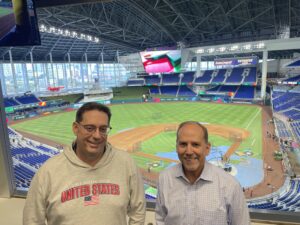
Bob Becker and Brian O’Gara prior to the Semifinals matchup between Mexico and Japan on March 20
The beauty of the World Baseball Classic is that host venues are located in areas where the sport is engrained in the fabric of their respective societies. In the early rounds, that couldn’t be truer for Pool A at Taichung Intercontinental Baseball Stadium in Taiwan and for Pool B in the Tokyo Dome. At the latter, MLB Manager, Global Event Experience, Emilie Matson was in Tokyo with the local promoter and its team, who really comprehend what it takes to produce the WBC. At the former, the venue was a bit unfamiliar since the World Baseball Classic hasn’t been played there in a decade.
“It was the first time we’ve done this workflow in Taiwan,” notes O’Gara. “But the energy of the crowds and the results of each of those games were fantastic. We couldn’t be happier with how [those] productions went.”
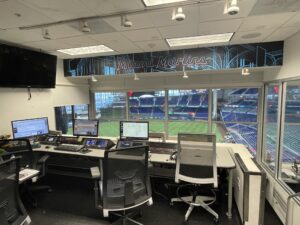
A view of the field from the Miami Marlins’ control room
Growing the sport and creating an attachment to the game are at the heart of the league’s mission for the World Baseball Classic. A look at the list of countries involved reveals a mixture of traditional powerhouses where ties to baseball run deep, including the U.S., Japan, Puerto Rico, Dominican Republic, and Korea. A closer look highlights nations where baseball has a small hold on the athletics landscape or is completely new: for example,. Great Britain, Czech Republic, and Italy. Both for nations that have played the game for years and for those just getting started, the WBC is a golden opportunity to highlight the competitiveness and excitement at the root of baseball.
“For a kot of the events that we do outside the regular season, it’s a priority for us to grow the game globally and reach new audiences,” says O’Gara. “This is all driven by the passion that these fans have for their countries.”
Partying in Miami: Van Wagner, Marlins In-Venue Team Energize Multiple Fanbases
For pool play, Quarterfinals, Semifinals, and Tuesday’s Championship between the U.S. and Japan, MLB recruited the services of Van Wagner for in-venue productions in the 305. Executing and excelling in this sector of the industry for such high-profile events as the Super Bowl, NFL Draft, and NCAA Men’s Final Four, O’Gara knew right away that Van Wagner was the right team to call for a job that would include production of 10 games in five days.
“It has been a tough stretch,” says O’Gara, “but [President, Productions,] Bob Becker is able to pay attention, read the flow of the game, and understand how these shows should be produced. I couldn’t ask for anybody better in that scenario.”
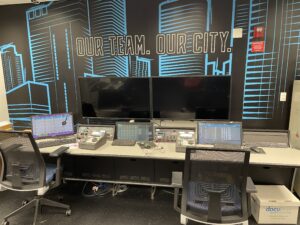
EVS replay servers in the production-control room
In a similar situation, O’Gara relied on the creative expertise of San Diego Padres Director, Game Presentation, Shannon Landers for pool play at Chase Field in Phoenix. Leveraging experience working with O’Gara and the MLB game-presentation team for tentpole events like the MLB All-Star Game and the 2020 World Series Bubble at Globe Life Field, as well as the crew led by Arizona Diamondbacks VP, Game Operations and DBTV Productions, Rob Weinheimer, productions in the desert entertained fans before operations consolidated in Miami. For both locations, O’Gara and the league developed “Fast Facts” sheets to get the crew up to speed between games.
Unlike at other events throughout the year, Becker is without his Van Wagner team in Miami. Even so, his history with the Marlins and his philosophy of working collaboratively with the host team have been critical to pulling off multiple days of doubleheaders.
“I got my start with the Marlins in 1993 as a producer in the old stadium,” says Becker. “It’s not easy for others to allow us to come into their home, but we want them to be a part of everything.”
With the Marlins deeply engrained in productions, Miami Marlins Director, Event Presentation, Conrad Bradburn is heavily involved in the process. For him, working this tournament has been a career highlight to assist the overall production, but the biggest challenge? He has been with the Marlins for about a month after a season as director, game presentation, for the Pittsburgh Pirates.
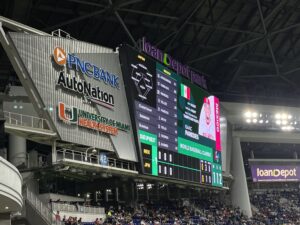
The main videoboard at loanDepot Park
“Preparing for the Marlins regular season has been a bit tough when you combine the responsibilities of this tournament with being brand-new,” he says. “April will be a bit hectic, but, by the time we get into May, everything will be rolling nicely. There will be a bit of a learning curve, but our show will continue to improve and evolve.”
In addition, Van Wagner doesn’t want to put any unnecessary strain on the Marlins crew after this tournament is over. With the club’s home opener in nine days vs. the New York Mets’ on Thursday, March 30, the staff is working with its typical arsenal of technologies and reframing the run of show to fit the competition.
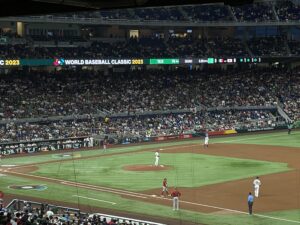
LED ribbon boards show branding for the World Baseball Classic.
“We can’t bring gear in and tear their control room apart,” Becker notes. “We essentially re-skinned the Marlins show, so videoboard elements are now in World Baseball Classic colors, and, instead of the more intricate stats that the Marlins would show during the regular season, we filled those [LED displays] with logos and other information. Per the WBC rules and pitch limits, we’re making sure that we’re showing fans and players each team’s pitch count.”
Play The Trumpets: Crew Focuses on Details, Adapts to Flow of the Game
Another major difference for this tournament is that Van Wagner isn’t receiving specialized content from each team. Tapping the resources provided by MLB Productions, MLB Network, and domestic broadcasters like Fox Sports, run of shows are built around footage captured throughout the tournament and graphics generated before the first game.
“MLB worked with Ross Video to create some of these graphics,” says Becker, “and we developed graphics as well. It has taken a lot to get the size of this graphics package done, and we had a lot of people join this project and work together as a team.”
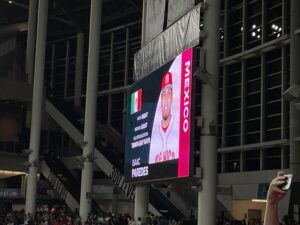
A smaller videoboard in left field is supplementing the in-venue show.
It’s one thing to go through a script and check off a set of boxes and obligations, but the secret to pulling off a memorable show is to stray from the predetermined run of show and spotlight the nuances that happen during the course of any game. For example, Puerto Rican closer Edwin Díaz doesn’t play for the Marlins, and this isn’t the MLB regular season, but the in-venue team would be remiss to not play “Narco” by Timmy Trumpet when the bullpen door swung open. When Díaz suffered an unfortunate injury during the victory celebration vs. the Dominican Republic, Becker and company pivoted once again to play “Narco” when Edwin’s brother, Alexis, came in to pitch against Mexico in the Quarterfinals. The crew also made sure to show Edwin’s No. 39 jersey hanging in the bullpen.
“It was more than just playing the trumpets: we canceled everything during that commercial break, waited for the bullpen door to open, and followed him all the way to the pitcher’s mound to create that emotion,” says Becker. “We have to adjust and create moments on the fly, and that’s what this crew has been really good at doing.”
Upward Trajectory: World Baseball Classic Continues To Evolve
Around baseball, the World Baseball Classic can be interpreted as a slow but powerful train moving down the tracks. For each tournament, players take their talents to their respective nations, and fans turned out to the ballpark in droves. To O’Gara, who was part of the first iteration, in 2006, the drastic improvement is apparent when looking at the bigger picture.
“The first game was the Dominican Republic vs. Venezuela at the ESPN Wide World of Sports complex in Walt Disney World,” he recalls. “Despite the capacity being pretty small, the energy and enthusiasm inside the ballpark were definitely there. [The WBC] was very much in its early stages, but, if you ask people around the MLB office and individuals within the Players Association, they’d say that some of those games were the best that they’ve ever seen. I have two tickets on my desk: one for that first WBC game, the other for the first game at Field of Dreams. That should tell you exactly what this tournament means to us.”
From a production point of view, a veteran like Becker has done about everything this career has to offer, but he’s finally able to say he produced his first set of games for the World Baseball Classic.
“I’ve worked on an Olympics,” he says, “but, whenever you get to do something that has national pride attached to it, my job becomes a lot easier because the crowds have bought into the do-or-die nature of this tournament. This is definitely something that I crossed off my bucket list, and I’m fortunate to a part of something that’s extremely special.”
